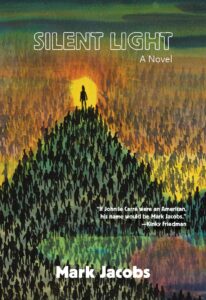
Mark Jacobs is one of my favorite storytellers. A fellow Returned Peace Corps Volunteer, he’s worked in Africa, the Middle East, and Asia, always attracted to places that are not tourist havens. I first learned of him reading The Stone Cowboy, in which a burnt-out American doper, fresh from a Bolivian prison, connives with a naive social worker while helping her find her magician brother—and ends up conducting her on a tour of the hell that is the coca trade.
This is Jacobs’ first book in thirteen years, and he introduces the reader to a different kind of hell set in Africa. Into the “heart of darkness” inspired by Conrad’s epic trip in 1890 down the Congo River, both Conrad and iconic writer Graham Greene influenced Jacobs’ creative genius.
The author is one of the most prolific writers in the U.S., having written over 170 articles over the last forty years. He’s helped me with several projects, including a documentary on Guatemala, and penned a testimonial for my latest book.
The main character of this epic journey is a 37-year-old Louisiana native, Smith, who is employed on an oil platform off the coast of West Africa. He grows tired of the platform and wins a “stash” of diamonds in a poker game. The only catch is that he has to find them in the immense, war-torn Democratic Republic of Congo.
The story begins in Kinshasa, the capital and largest city of the country. Smith meets a young woman named Béatrice, who hails from a village on the other side of the country. But she convinces Smith that his diamonds are a thousand miles away, although the trip would become longer and more perilous than he could have dreamed, traversing guerilla-patrolled back roads.
The author introduces the reader to the brutality of the inter-tribal divisions and fighting in this scene,
“I saw Mai-Mai slaughtering and eating flesh raw, tearing great strips off those beautiful animals. I saw my uncle’s severed head and the bodies of my cousins in a terrible heap. I saw dogs with red eyes and long tongues.”
Smith’s local companion, Béatrice, added an element of mysticism, such as this passage,
“He took a rolled-up snakeskin from a leather pouch on his belt. He handed it to Smith. Smith unrolled the skin from around the marble it protected. It was blue, yes. He put Béatrice’s magic in his pocket.”
Throughout the journey, Jacobs brings the reader face to face with the legacy of European imperialism in the heart of Africa, like Joseph Conrad, Graham Green, and VS Naipaul before him. The schools were empty, the roads a mess, but “the beer kept flowing.” The story reverses the tropes of the white savior to produce a story about a man who realizes you don’t have to travel to another country to get lost, nor do you have to go home to be found.
Even the book’s cover features an evocative design that matches the mysterious and adventurous nature of the story. It evokes a dense, dark jungle scene reflecting the novel’s setting in the heart of Africa and elements and silhouettes of a man possibly representing the protagonist, Smith, embarking on a perilous journey.
“If John le Carré were an American, his name would be Mark Jacobs.”
—Kinky Friedman
“Smart but never cynical, humane and utterly human, this is an ode to the wretched of the earth and the angels that walk among them. Welcome, a great American writer.”
—Marita Golden, author of The Wide Circumference of Love
Product details
- Publisher : OR Books (July 23, 2024)
- Language : English
- Paperback : 406 pages
- ISBN-10 : 1682194434
- ISBN-13 : 978-1682194430
- Item Weight : 04 pounds
- Dimensions : 5 x 1 x 8 inches
- Best Sellers Rank: #553,784 in Books (See Top 100 in Books)
- #1,887 in Crime Action & Adventure
About the Author
A former foreign service officer, Mark Jacobs has published over 170 magazine stories, including The Atlantic, Playboy, The Baffler, The Kenyon Review, and The Southern Review. His story “How Birds Communicate” won The Iowa Review Fiction prize. He has stories forthcoming in several magazines, including The Hudson Review. His story “Dream State” won the Dr. T.J. Eckleburg Kafka Prize. His five books include A Handful of Kings, published by Simon and Shuster, and Stone Cowboy, by Soho Press, which won the Maria Thomas Award.
About the Reviewer
Mark Walker was a Peace Corps Volunteer in Guatemala and spent over forty years helping disadvantaged people in the developing world. Walker’s three books are Different Latitudes: My Life in the Peace Corps and Beyond, My Saddest Pleasures: 50 Years on the Road, named Best Travel Book, and The Guatemala Reader: Extraordinary Lives and Amazing Stories. He’s written 80 book reviews, and of his 30 published essays, two were recognized by the Solas Awards for Best Travel Writing. He’s a contributing writer for “The Wanderlust Journal” and “Literary Traveler.” His column, “The Million Mile Walker Review: What We’re Reading and Why,” is part of the Arizona Authors Association newsletter. His honors include the “Service Above Self” award from Rotary International. He’s a Board member of SEEDS for a Future, Advance Guatemala and the Arizona Authors Association. His wife and three children were born in Guatemala. You can learn more at www.MillionMileWalker.com